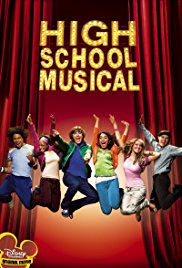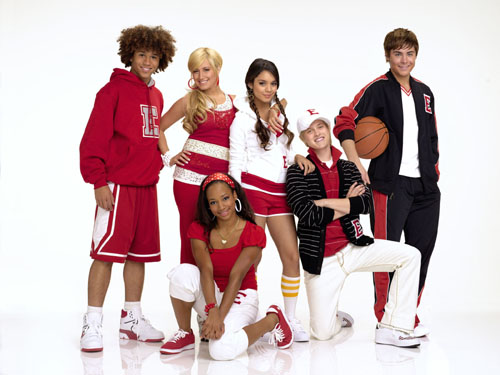Breaking Out
1. See the Quick Discussion Question.
2. What is the song “Start of Something New” about?
Suggested Response:
If you’re willing to start things that are new, the possibilities are endless.
3. What are the actors telling us in the song “We’re All in This Together”?
Suggested Response:
Here are some of the lyrics: ” … our dreams have no limitations/That’s what it’s all about/Everyone is special in their own way/We make each other strong/We’re not the same/We’re different in a good way/Together’s where we belong.” These themes stress the uniqueness of each individual; the fact that if we try to reach our dreams we can accomplish things we didn’t think we could; and that we should work together to help each other.
Peer Pressure and Friendship
4. Chad Danforth, Troy’s friend, did one really good thing in this movie. What was it?
Suggested Response:
Chad saw that Troy was upset because he had promised the basketball players that he would not try out for the musical. Chad realized that as Troy’s friend, he needed to support Troy in Troy’s desire to sing with Gabriella. Once he realized what was happening to Troy, Chad lost no time in doing this.
5. What is peer pressure?
Suggested Response:
Peer pressure can be described as influence on a person by other people who are about the same age or by their friends or classmates. It usually refers to kids. Usually, peer pressure makes young people act in the same way that their friends act. For example, Troy’s basketball buddies wanted him to focus only on basketball. Singing didn’t conform to their view of what basketball players did. The “Braniacs” wanted Gabriella to spend her time preparing for the academic decathlon.
6. Troy’s father told his son, “If your friends laugh at you, maybe they’re not your friends. Do you agree or disagree? Explain your reasons.
Suggested Response:
People do not laugh at their friends when their friends try to do something new or try to do the right thing. Instead, they should support their friends. Therefore, the answer is “yes”.
7. In this movie, both Troy and Gabriella had to overcome something in order to try out for the musical. What was it?
Suggested Response:
Troy had to overcome the peer pressure to conform to the limited view of who he was that was held by his group of friends on the basketball team and by his father. Gabriella had to overcome her shyness.
8. What is Troy singing about in the song “Get’cha Head in the Game”?
Suggested Response:
He’s having trouble concentrating on basketball. He keeps thinking of the callbacks and Gabriella. “Why am I feeling so wrong/My head’s in the game but my heart’s in the song/She makes this feel so right”.
9. What is the song “Stick to the Status Quo” about?
Suggested Response:
It’s about peer pressure (the influence of groups of friends or of people who are the same age or who are in the same class at school) and the conflict between peer pressure and the natural desire to be your own person and follow your own interests and dreams.
10. In the song “Breaking Free”, what are the kids breaking free from?
Suggested Response:
The kids are breaking free from the view of who they are that is held by their parents and their group of friends. Another way to see it is that they are learning to be themselves and that this understanding allows them to break free of restraints that are limiting their lives and to soar to new heights. Here are some of the lyrics: “You know the world can see us in a way that’s different than who we are/ Creating space between us until we’re separate hearts/ But your faith it gives me strength/ Strength to believe … /There’s not a star in heaven that we can’t reach if we’re trying/Yeah we’re breaking free/ … climbin’ to get to the place/To be all that we can be/ … Now’s the time /… So we’re breaking free.”
11. Gabriella told Troy that he was a cool guy but not for the reasons that his friends thought. What was she referring to?
Suggested Response:
She liked the fact that he was caring, truthful and authentic with her.
12. Have you ever had an experience in which you felt pressured by your friends to do something or not to do it? What happened?
Suggested Response:
There is no one correct answer to this question. In the discussion, adults should express approval of resistance to peer pressure and regret at examples in which peer pressure won out.
Talent
13. What happens to talent when it is not allowed to come out because of peer pressure or for some other reason?
Suggested Response:
It goes underground and may be lost forever.
14. How does Gabriella deal with her stage fright?
Suggested Response:
She focuses on Troy and sings to him.
Father/Son
15. What did you think of the relationship between Troy and his father?
Suggested Response:
It was pretty good. His father made some mistakes but they were close and they spent a lot of time together. Troy’s father gave him some good advice and, in the end, came through for Troy.



